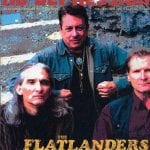The Flatlanders – One road more
It’s a star-studded event with a uniquely Austin twist, this second annual induction ceremony for the Texas Film Hall of Fame. Only Austin would expect the unlikely assemblage of Dennis Hopper, Cyd Charisse, Willie Nelson, Sissy Spacek, Lyle Lovett and former (forever, to this crowd) Governor Ann Richards to convene on the grounds of an abandoned airport in the middle of Austin’s nowhere. Joining them on this Friday evening in early March are hundreds of folks who love to rub shoulders with such luminaries, and who are willing to pay $5,000 for a banquet table of ten for the privilege.
Now that Robert S. Mueller Airport on the city’s underdeveloped northeast side has given way to the larger Austin Bergstrom International on the southeastern outskirts of town, the old airport’s huge Hangar 4 has been transformed into Austin Studios. The football-field-sized production facility is home base for the likes of Richard Linklater and Robert Rodriguez (who opens the Hall of Fame proceedings with some sneak footage of his forthcoming Spy Kids 2, shot here). On these grounds, adjacent to the parking lot of military vehicles for the Texas National Guard, this evening’s assemblage includes even the notoriously reclusive Terrence Malick, the brilliant director (Badlands, Days Of Heaven, The Thin Red Line) whose induction climaxes the ceremony.
Then it’s time for the hangar to transform itself into the world’s largest honky-tonk, featuring a group that, like Malick, has previously been more heard about than heard, more written about than seen. It has been more than 30 years since Joe Ely, Butch Hancock and Jimmie Dale Gilmore combined for their first recording, one that wouldn’t be widely distributed in the United States until 1990, when it bore the recast title More A Legend Than A Band. The album had previously resurfaced on vinyl (as One Road More) a decade earlier in England, where Ely’s raucous roadhouse music — though categorized as country in the States — was finding favor among roots-rockers and punk-rockers alike.
Without Ely’s ascendance, those Flatlanders tapes might still be languishing in a Nashville vault, all but unheard. It was Ely’s recording career that introduced the world at large to the songs of his Lubbock buddies Hancock and Gilmore, paving the way for both of them to enjoy (or at least endure) recording careers of their own. In stories about each of them, the Flatlanders’ myth has grown ever larger, as if the band were some sort of long-lost Rosetta stone of alternative country, a curiously time-warped amalgam of Texas traditionalism and hippie radicalism. Now that their lives have brought the interrelationship of Ely, Hancock and Gilmore full circle, the Flatlanders are threatening finally to become more a band than a legend.++++++++++++++++++++++++++++++++++++++++
This is an excerpt of the full article which appeared in The Best of No Depression: Writing About American Music, which features 25 of the finest articles from the magazines back issues, and was published in 2005 by University of Texas Press to help celebrate the magazines 10th anniversary. Due to our agreement with UT Press we are unable to include this article in our online archive.
The Best of No Depression is the only place you can find these articles other than our back issues. Visit the No Depression store to buy your copy for only $10.
The 300-page volume includes co-editor Grant Aldens award-winning 2001 feature on Billy Joe Shaver, co-editor Peter Blackstocks 1998 Artist of the Decade piece on Alejandro Escovedo, senior editor Bill Friskics-Warrens 2002 cover story on Johnny Cash, contributing editor Paul Cantins deep exploration of Yankee Hotel Foxtrot-era Wilco; and many other high points from our print heyday.
Table of contents for The Best of No Depression:
Preface, by Grant Alden and Peter Blackstock
Los Lobos, by Geoffrey Himes
Alejandro Escovedo, by Peter Blackstock
Jon Dee Graham, by Peter Blackstock
Billy Joe Shaver, by Grant Alden
Ray Wylie Hubbard, by John T. Davis
Flatlanders, by Don McLeese
Ray Price, by David Cantwell
Johnny Gimble, by Bill C. Malone
Johnny Cash, by Bill Friskics-Warren
Rosanne Cash, by Lloyd Sachs
Lucinda Williams, by Silas House
Buddy & Julie Miller, by Bill Friskics-Warren
Kasey Chambers, by Geoffrey Himes
Loretta Lynn, by Barry Mazor
Patty Loveless, by Bill Friskics-Warren
Kieran Kane, by Peter Cooper
Paul Burch, by Jim Ridley
Hazel Dickens, by Bill Friskics-Warren
Gillian Welch, by Grant Alden
Ryan Adams, by David Menconi
Jay Farrar, by Peter Blackstock
Jayhawks, by Erik Flannigan
Wilco, by Paul Cantin
Drive-By Truckers, by Grant Alden
Iron & Wine, by William Bowers




